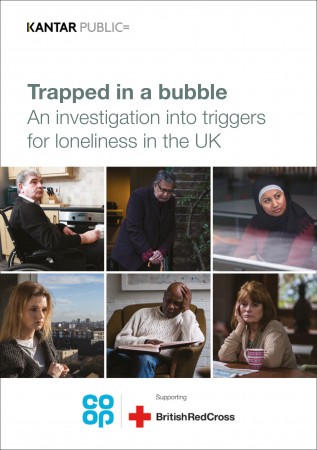The Co-op Group is continuing its campaign to tackle loneliness with a new report into the potential trigger points. The retailer has been fundraising for this cause throughout 2015 and 2016, in support of its charity partner, British Red Cross.
The report highlights that loneliness and social isolation affect people’s health, wellbeing and behaviour. Research has also shown that a lack of social connections can be linked to cardiovascular health risks and increased death rates, blood pressure, signs of ageing, symptoms of depression and risk of dementia.
The report also argues that different people need different kinds of support and loneliness cannot be addressed with a one-size-fits-all approach.
Mike Adamson, chief executive of the British Red Cross, said: “This is a crisis we cannot ignore, but if we come together it’s also a problem we can solve. Our research shows that life transitions are key triggers for loneliness. We need to focus on these moments and work together to prevent loneliness from taking hold in the first place, by responding quickly and helping people to recover once they’ve hit crisis point.”
Richard Pennycook, chief executive of the Co-op Group, added: “This rich insight shows that there is a role for businesses, individuals and community groups to play in preventing and responding to loneliness. Having identified the trigger groups we can act much earlier to prevent loneliness potentially becoming a chronic issue for many. It is clear that a lack of community groups can leave those experiencing loneliness with limited options to re-establish social connections.

“Our 70,000 colleagues, supported by members in the 1,500 communities in which we operate, have already shown their support for this important issue by enthusiastically raising money to fund British Red Cross services and that support will continue. In addition we will introduce new business approaches to support those either experiencing loneliness or at risk to the triggers of loneliness.”
The report has inspired a TV series on loneliness by Channel 4, looking at the lives of some of the people affected by it. The research has also identified eight ways in which the Group can help people reconnect with their communities. Services and support should give a sense of purpose to the individual; be peer-led and co-designed to include people in similar circumstances; be local to individuals and easy to access; be free or affordable; instil a sense of identity for participants who are going through a period of transition; provide sustained support, and clear goals and pathways out of support when appropriate; benefit others and ‘give back’ to society, which can make individuals feel ‘useful’; and be built around shared interests.
The Group’s fundraising campaign will enable the British Red Cross to provide new services to support up to 12,500 people experiencing loneliness to reconnect back to their communities. The campaign reached its fundraising target of £4m in just one year and is now aiming for £5m.
The British Red Cross is providing professional community connectors specialising in psychosocial support and will also offer dedicated services targeted at people with complex needs following life-changing events.
The Group is also calling on its members to volunteer with the British Red Cross to help deliver the new services to support those experiencing loneliness. In addition, the retailer is relaunching its Employee Assistance Programme, which enables colleagues to seek less formal support as well as support for more serous issues. The Group’s Funeralcare business will also expand and develop its social groups for the bereaved while the insurance business is sponsoring Neighbourhood Watch to set up 30,000 new groups to help strengthen and bring communities and neighbours together.

